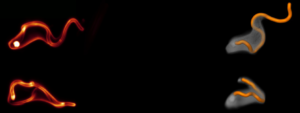Fellow Spotlight: Dr. Mabel Tettey
Dr. Mabel Tettey is a Postdoctoral Research Fellow in Dr. Michael Grigg’s lab at the National Institute of Allergy and Infectious Disease and a 2023 JCC Fellow. Dr. Tettey studies trypanosomes that cause African sleeping sickness. Specifically, Tettey examines the molecular mechanisms underpinning trypanosome interactions with their mammalian hosts. She hopes that understanding the fundamental molecular biology of trypanosomes will reveal fundamental principles thereby enabling novel strategies to predict and prevent future outbreaks.
African trypanosomes are protozoan parasites that are transmitted by tsetse flies to humans and other mammals resulting in African sleeping sickness. Trypanosomes undergo a morphological change in the bloodstream of their mammalian hosts from “slender” to “stumpy” forms (Figure 1). This morphological change accompanies a functional conversion from cellular proliferation to parasitic transmission. However, it was not clear what molecular signal(s) controlled these morphological and functional changes.
 3D-volume (left) and 3D-surface (right) models of slender (top) and stumpy (bottom) Trypanosomes. Image from Schuster et al., 2017.
3D-volume (left) and 3D-surface (right) models of slender (top) and stumpy (bottom) Trypanosomes. Image from Schuster et al., 2017.
During her PhD studies in Dr. Keith Matthew’s lab at the University of Edinburgh, Dr. Tettey helped identify a surface oligopeptide transporter in the parasite Trypanosoma brucei that is involved in Slender to Stumpy differentiation. This transporter uptakes oligopeptides into the parasite. Tettey demonstrated that two peptidases secreted by trypanosomes are crucial for generating signal peptides. These studies identified key molecules required for Trypanosome transmission that may be useful drug targets to prevent disease transmission.
Deep sequencing trypanosomes to search for functional differences
Dr. Tettey is now studying how the process of hybridization influences trypanosome virulence and transmission. Gene mixture between parasites results in genetically-distinct variations of trypanosomes, or hybrids. Therefore, by analyzing the genome of trypanosome, Tettey aims to decipher the degree to which hybridization is occurring and the genetic variations that regulate trypanosome virulence or result in gaining new attributes. Dr. Tettey will collect and examine samples from various endemic regions across Africa (i.e. Ghana, Gambia, Nigeria, etc.). Examining samples from different areas will enable Tettey to gain a more comprehensive understanding of the extent of hybridization. Ultimately, Dr. Tettey’s insights from these studies may provide valuable information for the development of geographically- and molecularly-informed control strategies aimed at reducing trypanosome transmission and preventing sporadic outbreaks.

Dr. Mabel Tettey
In the future, Dr. Tettey aims to start her own lab at the NIH or a university in the US. Originally from Ghana, Tettey developed a passion for scientific research during her undergraduate studies at Kwame Nkrumah University of Science and Technology in Kumasi. After establishing her lab, Tettey plans to expand her research back to Ghana to provide novel research opportunities for Ghanaian students and facilitate research collaborations that leverage the strengths of all participants.
Dr. Tettey extends her heartfelt appreciation to the JCC for this incredible opportunity. Their support and investment will undoubtedly drive significant scientific breakthroughs.